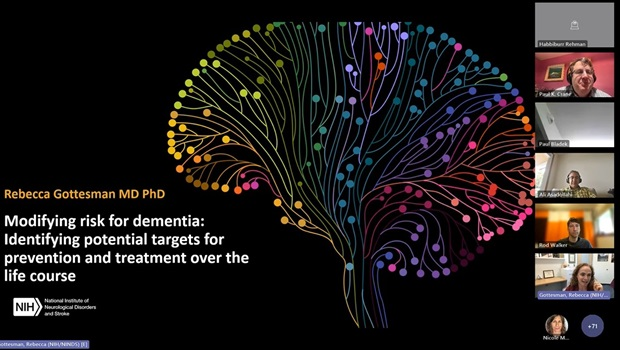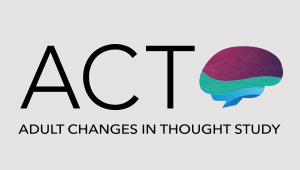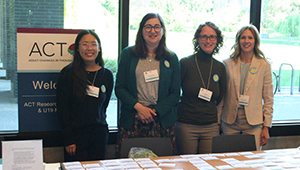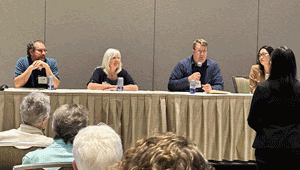ACT Research Symposium meets virtually to discuss brain aging science

Rebecca Gottesman, MD, PhD, (bottom right) presents the 2025 ACT symposium keynote speech.
This year’s symposium was a virtual event drawing over 130 attendees
In May, the Adult Changes in Thought (ACT) 12th Research Symposium occurred over the course of 2 days. Researchers and interested individuals gathered online to discuss research related to the ACT Study and brain aging science.
The ACT Study is a long-running cohort study that follows older adults who receive care as Kaiser Permanente Washington members. Since 1994, thousands of adults have enrolled in the study, contributing a wide range of information with a goal of helping to develop better ways of preventing Alzheimer’s disease and dementia.
Co-leads of the ACT Study are Linda McEvoy, PhD, of Kaiser Permanente Washington Health Research Institute (KPWHRI); Paul Crane, MD, MPH, of University of Washington; and Andrea LaCroix, PhD, of University of California, San Diego.
“I am so grateful to all the wonderful presenters and attendees who took part in this year’s symposium,” said McEvoy. “It was exciting and inspiring to learn more about the broad range of projects leveraging the ACT Study’s rich data sources to advance research on brain health and aging.”
This year’s theme was “Vascular contributions to cognitive impairment and dementia with a focus on sex differences.” The keynote presentation was given by Rebecca F. Gottesman, MD, PhD, senior investigator and chief of the Stroke Branch at the National Institute of Neurological Disorders and Stroke, part of the National Institutes of Health. Gottesman’s presentation discussed the relationship between midlife factors and the risk of dementia, emphasizing the importance of vascular health and social engagement. Her research found that individuals with multiple risk factors in midlife had a significantly increased risk of dementia in late life.
In addition, the symposium showcased a wide range of scientific advancements and research.
In the biomedical imaging space, Juan Eugenio Iglesias, PhD, of Harvard Medical School discussed tools that turn 2D photographs of postmortem brain slices into 3D reconstructions, providing more detailed images for analysis, much like you would get from an MRI.
In another session, ACT Study scientist Katherine Prater, PhD, of University of Washington presented her research showing that individuals who are resilient to Alzheimer’s disease have alterations in their microglia (brain immune cells) and their gene expression.
Rounding out the symposium’s key scientific highlights, the University of Washington’s Shelly Gray, PharmD, MS, and Inez Pranoto, PhD, shared findings from ACT Project 3. The aim of this research is to understand how drugs that are commonly used by older adults for blood pressure, bladder problems, sleep problems, and other conditions may affect the progression of cognitive decline. Using ACT Study data, the researchers have combined what is currently known about the clinical effects of certain medications and are testing their potential impact on dementia risk using a cell-based model.
Another high point of the symposium was an invited community talk by Allyson Schrier, co-founder and president of ZinniaTV, which provides calming content to people with dementia through slow-paced videos with vivid visuals and minimal dialogue. ZinniaTV’s approach has been shown to reduce agitation, decreasing the need for antipsychotic medications for some people. Schrier was inspired by her personal experience caring for her husband, who was diagnosed with frontotemporal dementia.
Speaker recordings and slides from this year’s symposium are now available for public viewing on the ACT Study website.
By Joe Scott
Learn About the ACT Study

Understanding brain aging
For over 30 years, the Adult Changes in Thought (ACT) Study has been advancing our understanding of cognition, aging, and better ways to delay and prevent Alzheimer’s disease and related dementias.
2024 ACT Symposium

Researchers connect for ACT Symposium, advancing science on dementia, aging
The long-running ACT Study is now in its 30th year.
2023 ACT Symposium

Researchers gather to address critical topics in aging and dementia
The ACT Research Symposium returns with an in-person scientific forum.


